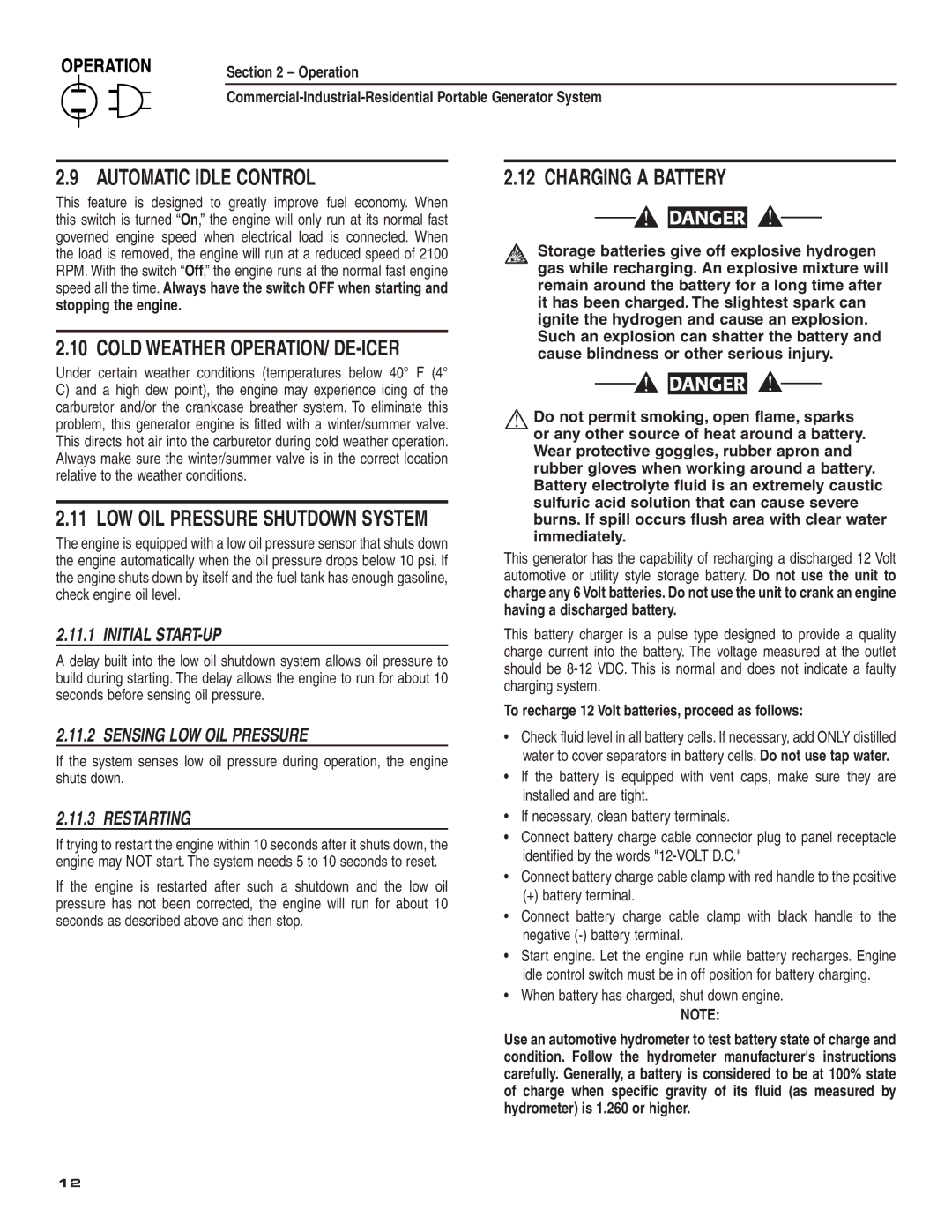
Section 2 – Operation
2.9 AUTOMATIC IDLE CONTROL
This feature is designed to greatly improve fuel economy. When this switch is turned “On,” the engine will only run at its normal fast governed engine speed when electrical load is connected. When the load is removed, the engine will run at a reduced speed of 2100 RPM. With the switch “Off,” the engine runs at the normal fast engine speed all the time. Always have the switch OFF when starting and stopping the engine.
2.10 COLD WEATHER OPERATION/ DE-ICER
Under certain weather conditions (temperatures below 40° F (4°
C)and a high dew point), the engine may experience icing of the carburetor and/or the crankcase breather system. To eliminate this problem, this generator engine is fitted with a winter/summer valve. This directs hot air into the carburetor during cold weather operation. Always make sure the winter/summer valve is in the correct location relative to the weather conditions.
2.11 LOW OIL PRESSURE SHUTDOWN SYSTEM
The engine is equipped with a low oil pressure sensor that shuts down the engine automatically when the oil pressure drops below 10 psi. If the engine shuts down by itself and the fuel tank has enough gasoline, check engine oil level.
2.11.1 INITIAL START-UP
A delay built into the low oil shutdown system allows oil pressure to build during starting. The delay allows the engine to run for about 10 seconds before sensing oil pressure.
2.11.2 SENSING LOW OIL PRESSURE
If the system senses low oil pressure during operation, the engine shuts down.
2.11.3 RESTARTING
If trying to restart the engine within 10 seconds after it shuts down, the engine may NOT start. The system needs 5 to 10 seconds to reset.
If the engine is restarted after such a shutdown and the low oil pressure has not been corrected, the engine will run for about 10 seconds as described above and then stop.
2.12 CHARGING A BATTERY
![]()
![]() DANGER
DANGER ![]()
Storage batteries give off explosive hydrogen gas while recharging. An explosive mixture will remain around the battery for a long time after it has been charged. The slightest spark can ignite the hydrogen and cause an explosion. Such an explosion can shatter the battery and cause blindness or other serious injury.
![]()
![]() DANGER
DANGER
Do not permit smoking, open flame, sparks or any other source of heat around a battery. Wear protective goggles, rubber apron and rubber gloves when working around a battery. Battery electrolyte fluid is an extremely caustic sulfuric acid solution that can cause severe burns. If spill occurs flush area with clear water immediately.
This generator has the capability of recharging a discharged 12 Volt automotive or utility style storage battery. Do not use the unit to charge any 6 Volt batteries. Do not use the unit to crank an engine having a discharged battery.
This battery charger is a pulse type designed to provide a quality charge current into the battery. The voltage measured at the outlet should be
To recharge 12 Volt batteries, proceed as follows:
•Check fluid level in all battery cells. If necessary, add ONLY distilled water to cover separators in battery cells. Do not use tap water.
•If the battery is equipped with vent caps, make sure they are installed and are tight.
•If necessary, clean battery terminals.
•Connect battery charge cable connector plug to panel receptacle identified by the words
•Connect battery charge cable clamp with red handle to the positive
(+)battery terminal.
•Connect battery charge cable clamp with black handle to the negative
•Start engine. Let the engine run while battery recharges. Engine idle control switch must be in off position for battery charging.
•When battery has charged, shut down engine.
NOTE:
Use an automotive hydrometer to test battery state of charge and condition. Follow the hydrometer manufacturer's instructions carefully. Generally, a battery is considered to be at 100% state of charge when specific gravity of its fluid (as measured by hydrometer) is 1.260 or higher.
12
